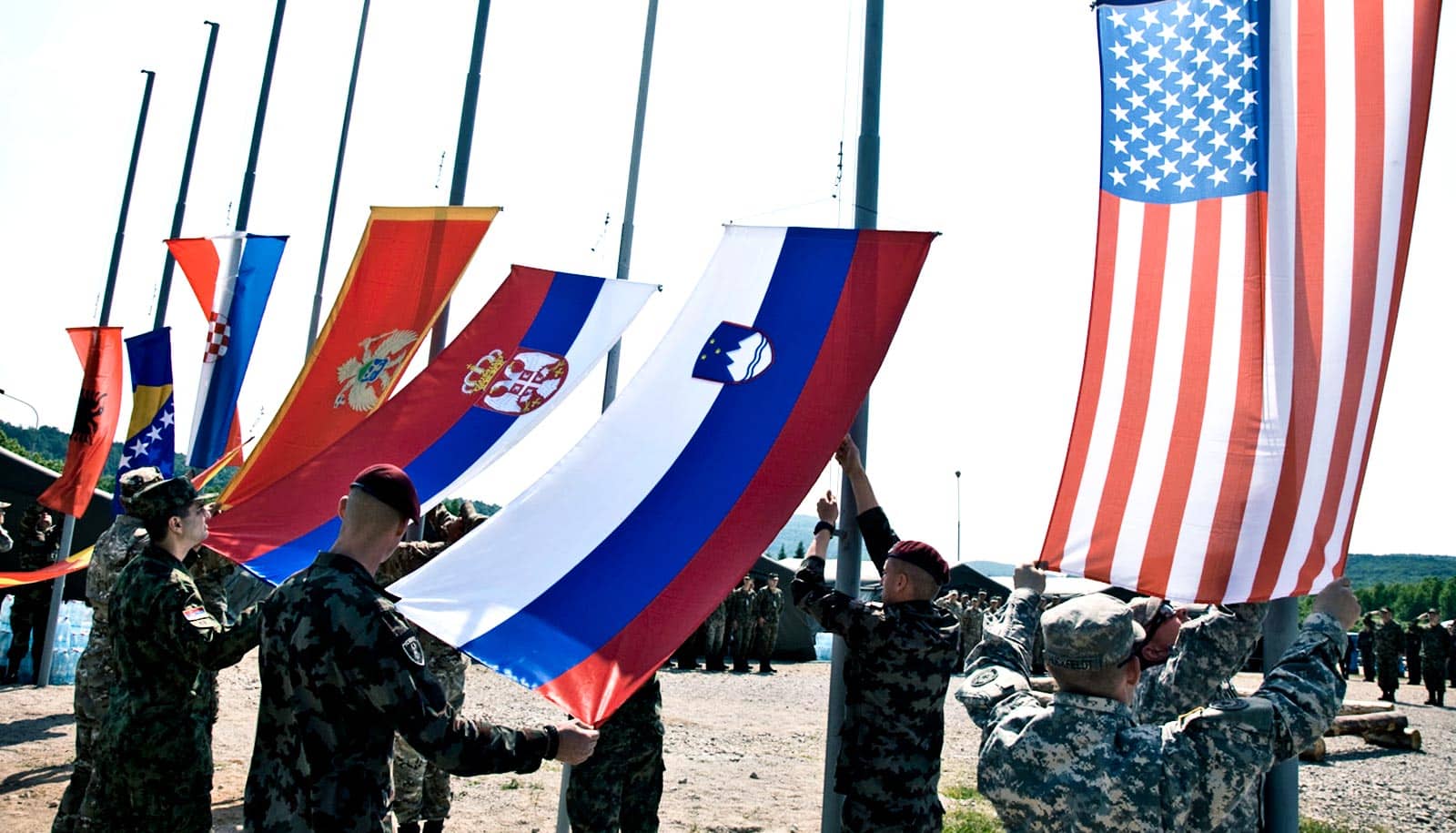President Donald Trump has said that the North Atlantic Treaty Organization (NATO), an almost 70-year-old international organization, may be “obsolete”—igniting a national debate over whether the United States should continue to take a leading role in the promised defense of European nations, who some perceive to have invested insufficiently in their own militaries.
While the administration has stopped short of a “pay up or else” message, strong words from the president and others have led some world leaders to wonder if the days of relying on the US as an indispensable ally are over.
For many of us, mention of NATO conjures little more than a fuzzy memory from history class. But at the time of its birth, it was considered an indispensable safeguard against a looming existential threat.
Created by the North Atlantic Treaty in 1949 with nations from Western Europe and the United States and Canada, it was formed to provide a common defense against possible attacks from the Soviet Union in the early Cold War years. Over time, its membership grew from 12 to 29, with some countries—such as Spain, Greece, and Turkey—transitioning into democracies after they became members.
But where does that leave NATO today? Michael John Williams, director of New York University’s international relations program and the author of The Good War: NATO and the Liberal Conscience in Afghanistan (Palgrave Macmillan, 2011) and NATO, Security, and Risk Management: From Kosovo to Kandahar (Routledge, 2009) discusses the intricacies of transatlantic relations and what the consequences for a weakened NATO might be.
If its original purpose was to provide for defense against possible attacks from the Soviet Union, why did NATO outlast the Cold War?
In the early 1990s, after the Soviet Union imploded, the organization was essentially left wondering: What now? The Warsaw Pact, which had been the Soviet response to NATO—supposedly a mutual defense organization, although the members were coerced rather than joining voluntarily—dissolved. Essentially, NATO said that the doors were open to former Warsaw bloc countries, and that any country that meets the criteria could join. There were several rounds of enlargement in the mid-’90s and 2000s, and even discussion about Russia becoming a member at one point. Most recently Montenegro joined, just this year.
NATO’s core mandate remains the territorial integrity and defense of all of the allies, which is provided by something called Article 5—the mutual defense clause of the treaty. That means that if one country in NATO is attacked, all the other countries should respond, though there is a lot of doubt about what the response would be if one of the NATO countries were attacked today.
It’s considered the most successful military alliance in history, but it’s more than just a military alliance—in fact a lot of what it does it pretty mundane: standardizations of radio frequencies and bullets and interoperability and protocol and operations and procedure.
Multinational organizations can be very complex, especially when you’re in a combat zone. As Wesley Clark, who commanded the Kosovo operation for NATO in 1999, said, “the only thing worse than going to war with allies is going to war without allies.”
President Trump and others have criticized European NATO members for not playing a larger role in the fight against terrorism. What else should they do?
The NATO allies were in Afghanistan for more than a decade to provide for the defense of NATO and the Hindu Kush, preventing terrorist activities that would develop there from affecting Western countries in Europe and the United States. The only time Article 5 has ever been invoked was after the September 11 attacks. NATO offered AWACS [Boeing airborne warning and control system aircraft] and intelligence and more, but the Bush administration said “Thank you, but no thank you.”
NATO also has an assistant secretary general for emerging challenges; they’ve worked on counterterrorism strategies within the alliance, they have a terrorism intelligence cell, and they have trafficking and arms regulations in middle Europe and in the Caucasus, which helps prevent terrorism. So to say NATO has done nothing on terrorism is, I think, a pretty empty argument, although it’s also not the core of what NATO does.
Counterterrorism operations are really the purview of security services—intelligence services and signal services that pick up and interpret data and then devise a strategy. And then in domestic societies it’s really up to domestic intelligence services—the FBI, the judicial system, the police—to manage the security problems. So NATO’s role could be bigger, but then it also steps on other people’s feet.
European NATO members have also been called out by President Trump for not contributing their “fair share” to the alliance. Is the United States shouldering an outsized portion of the burden?
I think the debate here often focuses far too much on what Europeans aren’t doing, when actually they do massive amounts of peacekeeping, reconciliation, and stabilization work in Africa, Europe, and elsewhere that is hugely valuable to us. And there are far more commonalities between our societies than we have with most others.
There’s a fair charge that Europeans have underinvested in military capabilities and development, but this is not a new issue. It became acute at the end of the Cold War, when lots of countries—including the United States under Bill Clinton—cut way back on defense spending. This was discussed at the Wales Summit a few years back, where all the allies committed to have increased defense spending by 2024, aiming for 2 percent. Several allies have, and it’s only 2017. So to go on about this is kind of disingenuous.
NATO is a political military organization—it’s not just about weaponization. Its primary job is a form of political discussion, decision-making, consensus, and capabilities development. Furthermore, the costs that we invest in NATO are relatively small compared to what costs would be to actually intervene in a European conflict if something were to break out and we had to bring military operations there.
The whole point of the US underwriting NATO from the get-go was the idea that it was better to do this than to have to fight another World War II-like conflict. If you think that the US has a national interest in stability in Europe, then the investment is pretty minimal. Sure, NATO needs reform. It needs updating. Europeans do need to invest more, and it would be good if they did lead more in NATO. But do Germans really need to spend 2 percent of GDP on defense? Probably not. I’d rather see a focus on abilities and deployability, and not just an arbitrary number.
Would there be a downside to the United States taking less of a leading role in NATO, and adopting a more isolationist stance regarding international relations in general?
I suppose it comes down to your world view and your belief about what sort of country you want. Since the end of the Second World War, the United States citizenry has supported, financially, through taxes, the maintenance of a liberal world order. That’s one that’s tried to move away from total power politics—survival of the fittest, where the strong do what they want and the weak suffer what they must—and toward a rules-based, international law-based system, with an economic foundation in free trade.
In what is called the transatlantic bargain, the Europeans underwrote American economic hegemony in exchange for defense. It was about establishing a system of global governance, and avoiding conflict through negotiation and arbitration. That whole order is built on the US-European consensus, which exists in NATO. And then that system becomes the foundation for what happened in Asia throughout the Cold War, and the development of the alliance with South Korea, the rehabilitation with Japan, and more.
But lately it seems like the US is no longer interested in investing financially, emotionally, and in terms of leadership with these transatlantic organizations. This problem with NATO and US leadership doesn’t start with President Trump. President Obama pursued, unfortunately, in my opinion, a relatively weak foreign policy that didn’t provide much leadership. He had a lot of disdain for Europe and European Union meetings. He thought they were boring and a waste of time. He thought Europe was done and dusted. In the end, when you look at his presidency in 10 or 20 years, the Middle East was a mess when he came and it was a mess when he left.
Asia was in flux when he came and was in flux when he left. Europe when he arrived was whole and free, Europe by the time he left had the largest territorial change to status quo—the seizure of a massive chunk of real estate [in Ukraine] through force—since 1939.
With Vladimir Putin’s recent actions in Eastern Europe, does it almost seem as though NATO’s original purpose—defense of Europe against Russia—is newly relevant?
I do think that core mission very much remains. Astute observers of Russia would say that there’s essentially a conflicting world vision between the Europeans and North Americans on the one hand, and Russia and other countries—China, to some extent, and a variety of countries in the Middle East—on the other.
There’s a global vision based on the rule of law and universal human rights versus 19th-century balance of power politics. At times, the US has definitely abused its dominant position in the world and done things that maybe don’t mirror its ideals, but by and large, it’s pretty well-regulated by the system it’s created.
Putin wants to break up the unity of Europe in the European Union, but he also wants to see a break up of Euro-Atlantic solidarity, whether that’s through force or through propaganda.
If you want to just have an idea of the possible consequences of that, Ukraine is a good example, with the cyber war and interfering in elections that Russia has been trying out there.
I think America really needs to have a discussion about what kind of country we want to be and what kind of leadership we want. If it is a smaller role in the world, that’s fine, but there will be consequences, and it’ll mean that maybe different countries will become more prominent, and that their values become more embedded at a global level. It’s a decision we need to make, but the disturbances around the last election haven’t helped us reach a consensus in the US.
NATO is almost 70 years old. Do you see it still existing 70 years from now?
How about seven years? Seventy years is a long way away. I hope so. I think the idea of a world government is too aspirational and not realistic, but I do believe that strong relations between North America and Europe are in our best interest.
I was fortunate to be able to live and work in the European Union for many years, and I would love to see a free trade zone that allowed for easier movement of peoples in the region. I’d love to see more economic integration and I would hope NATO would be the core of that. I hope that NATO doesn’t ever have to declare Article 5 again—but then again, that’s the whole point of it, right?
We struggle with the question of how to run our societies at the international level, and there’s no overarching authority, so unfortunately the resort to violence is always a possibility. And it sounds horrible to say this, but the best defense is a good offense.



